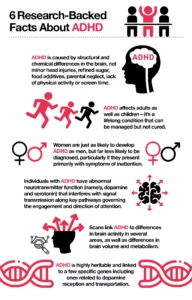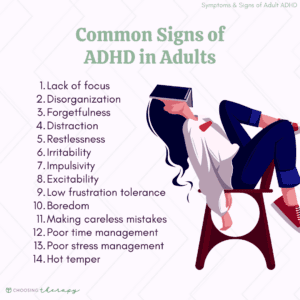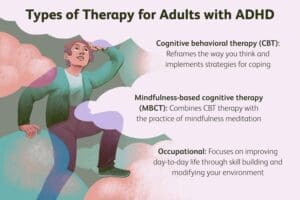What is ADHD Masking?
Attention-deficit/hyperactivity disorder, better known as ADHD, is one of the most common neurodevelopmental disorders in childhood, according to the Centers for Disease Control and Prevention. However, ADHD does not impact children only. ADHD is a lifelong disorder that goes underreported and underdiagnosed in adults. Many adults with ADHD hide or “mask” their symptoms due to social stigmas, causing their symptoms to go untreated and their daily lives, at best, complicated. But what is ADHD masking? Is masking bad and can adults with ADHD learn to stop masking their symptoms?
In this blog you will learn about the following topics:
- Do adults have ADHD?
- What is masking ADHD?
- How do I stop masking ADHD?

Infographic courtesy of The Amino Company
Do adults have ADHD?
Yes, adults have ADHD and it can cause people real difficulties in their everyday lives as adults.
I had never really given much thought to how differently my brain works than my peers until I was well into adulthood. At that point, I did not consider myself a “fully formed” adult. Sometimes it felt as if I was playing pretend and by the skin of my teeth, I was convincing those around me that I actually knew what I was doing with my life. Little did I know that this was something I had in common with folks walking around formally diagnosed with ADHD.
And for those with related symptoms, “adulting” can feel a lot like wearing a mask to feel more “normal.”

Image courtesy of Choosing Therapy
What is masking ADHD?
Masking is a behavior ADHD folks (and other neurodiverse folks, too) rely on to “mask” or minimize their symptoms to fit in more seamlessly with their peers, though it’s exhausting and leads to burnout.
But if it is so exhausting, why mask?
Shame.
Symptoms typically associated with ADHD are viewed negatively (for example, disorganization, procrastination, and forgetfulness). Labels are used to describe an “incomplete” person. It makes complete sense why people choose to hide their issues: they do not want to be judged. Some do not want to be seen asking for help because they’re things we should “just know by now.” Others might avoid making plans with new friends because they are worried they will forget and get called a “flake.”
The fear of being perceived as incompetent has convinced us to hide all the parts that make us feel like an imposter. Fasly we believe that if we just pretend like we have it together, just do the thing and move on, then we’ll be able to convince everyone that we are in fact adults, competent ones at that. Not only is this exhausting, but it can feel soul-crushing to believe you have to pretend when you interact with anyone.
But let me tell you: you are not alone and I acknowledge how hard it is to be an adult with ADHD, for either late- or self-diagnosed folks.
While masking might help with the day-to-day, it can also do some damage. For one, it can delay a formal diagnosis (if you are seeking a formal diagnosis, that is). For many many years, clinicians have viewed ADHD as a childhood diagnosis, something to be outgrown. But 60% of children with ADHD become adults with ADHD, less than 20% of those adults have a diagnosis and only a quarter of them seek treatment. But if you had accommodations, a supportive environment, or learned how to mask, your symptoms might have not been overlooked.

Infographic courtesy of VeryWell Health
How do I stop masking ADHD?
All is not lost. Here is a reminder for you masked ADHD folks: There is no single point in life where you will know everything you need to know.
Masking has a lot to do with not wanting to be seen as “in progress.” We are allowed to ask questions, to be confused, and to seek guidance. We spend so much of our brain space trying to keep it together that we forget that all humans, neurotypical humans included, make mistakes. Your worth as an adult is not tied to how well you mask in the neurotypical world. You are not less of an adult if you struggle to get to appointments on time. You are not immature if your space is filled with small piles of organized chaos. You are not a nuisance for needing to set a million alarms so you complete tasks on time.
Dropping the mask is a privilege. It means you have found people that you trust with your whole chest. So consider asking for support when you do not know how to do something. Let a loved one sit with you while you tidy a room. Think about reaching out to a therapist when life gets overwhelming and you need support.
Remember that life is a constant learning experience. If you allow yourself to struggle, it challenges the desire for perfectionism that weighs on many ADHD folks, and dropping that mask might feel a little less scary. It will help your loved ones understand your struggles and learn how to support you better. It is easier said than done, but truly living comes from making use of the community you choose to surround yourself with and being ballsy enough to say “I can’t do this alone.”
More from CFR
Are you struggling with panic attacks, feeling anxious in social situations, or coping with the long-term effects of trauma? CFR’s experienced mental health professionals can help. We offer individual therapy, support groups, and specialized care for mental health conditions. Request an appointment today to get matched with a CFR therapist who can help you navigate your healing journey.
Stay informed on the latest mental health insights, therapy options, and CFR updates. Sign up for our newsletter to be the first to read new blogs, learn about upcoming events, and access expert resources on mental health and wellness.
Purim and Mental Health: What the Holiday Can Teach Us about Ourselves
